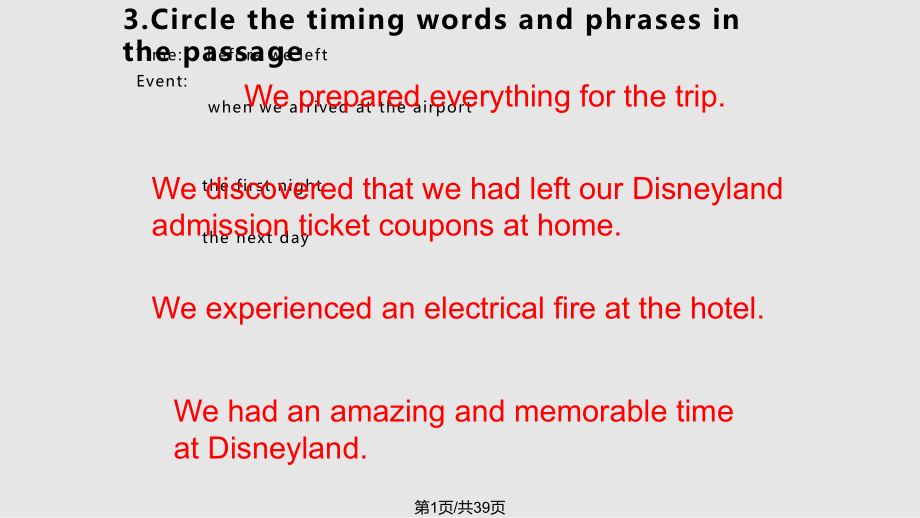《UnitWhatawonderfultimeReading and WritingPPT課件》由會(huì)員分享��,可在線閱讀,更多相關(guān)《UnitWhatawonderfultimeReading and WritingPPT課件(39頁珍藏版)》請(qǐng)?jiān)谘b配圖網(wǎng)上搜索�����。
1�����、3.Circle the timing words and phrases in the passageTime: before we leftEvent: when we arrived at the airport the first night the next day We prepared everything for the trip.We discovered that we had left our Disneyland admission ticket coupons at home.We experienced an electrical fire at the hotel
2����、.We had an amazing and memorable time at Disneyland.第1頁/共39頁第2頁/共39頁第3頁/共39頁第4頁/共39頁Reading and Writing:A Journey to Hong Kong Disneyland第5頁/共39頁Warm-upLead-inQ: 1. Have you ever been to Disneyland? Have you heard of Disneyland? 2. Which is the best spare-time activities for yourselves? Discuss in g
3、roup and sum up.New words in the reading 1. experience n. 經(jīng)驗(yàn)�,經(jīng)歷,體驗(yàn) v. 經(jīng)驗(yàn)���,經(jīng)歷����,體驗(yàn)(過去式:experienced 過去分詞:experienced 現(xiàn)在分詞 experiencing)第6頁/共39頁2. lucky adj. luck n. luckily adv.3. otherwise 4. determine第7頁/共39頁Listen to the tape and read after it.A.Remember the difficult sentences and try to recite them.
4����、1.Last summer vacation, I had my first and unforgettable travel experience at Hong Kong Disneyland. 去年暑假�,我第一次去了香港迪斯尼樂園,這次旅行經(jīng)歷令人難忘。 a. experience 用作經(jīng)歷時(shí)是可數(shù)名詞����,用于經(jīng)驗(yàn)時(shí)是不可數(shù)名詞。experience 用作及物動(dòng)詞�����。意為經(jīng)歷�,遭受。eg:Everyone experiences these problems some time in their lives. b.這里 travel 用作名詞�����,修飾experience, 表示旅行經(jīng)歷�。 2.
5、 No matter how well you prepare, sometimes things still go wrong.不管你準(zhǔn)備的有多充分�,有時(shí)仍然會(huì)出錯(cuò)。 第8頁/共39頁注意注意“no matter+疑問詞疑問詞”結(jié)構(gòu)與結(jié)構(gòu)與“疑問詞疑問詞+ever”在用法上的區(qū)別在用法上的區(qū)別1.“no matter+疑問詞疑問詞”結(jié)構(gòu)結(jié)構(gòu)只能引導(dǎo)讓步狀語只能引導(dǎo)讓步狀語從從句��,這時(shí)可以和句�����,這時(shí)可以和“疑問詞疑問詞+ever”互換�����。如:互換。如:No matter where he may be (=Wherever he may be), he will be happy. 2. 而而w
6����、ho/whom/which/whose/what+ever還可以還可以引導(dǎo)名詞性從句引導(dǎo)名詞性從句。wherever 引導(dǎo)地點(diǎn)狀語引導(dǎo)地點(diǎn)狀語從句����;從句;whenever 引導(dǎo)時(shí)間狀語引導(dǎo)時(shí)間狀語從句從句 Give this book to whoever likes it. 誰喜歡這本誰喜歡這本書就給誰吧����。(這里不能用書就給誰吧。(這里不能用no matter who�����。)����。)第9頁/共39頁3.注意從句的時(shí)態(tài)注意從句的時(shí)態(tài):由由no matter what/who/where/when引導(dǎo)的從引導(dǎo)的從句往往用句往往用一般現(xiàn)在時(shí)或一般過去時(shí)一般現(xiàn)在時(shí)或一般過去時(shí)。No matter who y
7���、ou are, you must obey the rules. 無論你是誰��,都應(yīng)該遵守規(guī)則�。無論你是誰��,都應(yīng)該遵守規(guī)則���。4.no matter how+ adj/advNo matter how hard he works, he finds it difficult to make ends meet. 無論他多么努力工無論他多么努力工作����,卻總是入不敷出����。作,卻總是入不敷出�����。第10頁/共39頁3.3.Otherwise,we would have had to go back home.否則��,我們不得不回家���。副詞副詞otherwise引導(dǎo)引導(dǎo)含蓄虛擬語氣:含蓄虛擬語氣:有時(shí)為了表達(dá)的需要���,
8�����、有時(shí)為了表達(dá)的需要��,在虛擬語氣中�,并不總是出現(xiàn)在虛擬語氣中��,并不總是出現(xiàn)ifif引導(dǎo)的條件句�����,而通過其引導(dǎo)的條件句��,而通過其它手段來代替條件句��。它手段來代替條件句����。常用的有常用的有介詞介詞with,without�����,but for(倘沒有�,要不(倘沒有���,要不是);是)����;連詞連詞or����,but;副詞副詞otherwise等�。等。eg:I was ill that day. Otherwise, I would have taken part in the sports meeting.=If I hadnt been ill that day, I would have taken part in
9���、the sports meeting.第11頁/共39頁4. Accidents will happen, and the first night we were unlucky enough to experience an electrical fire at the hotel.意外總是避免不了�����,第一個(gè)晚上我們就很不走運(yùn)�,在酒店里遇上了電氣火災(zāi)�。 accident n. 意外,偶然的事�,(交通)事故 e.g. Many people witness the accident. by accident 偶然,意外地5. Luckily it was put out in time, but
10����、 we found it difficult to fall asleep again. 幸好火被及時(shí)撲滅了����,但我們卻難以入睡了�����。 a. put out 意為“撲滅” put away 將收起 put aside 忽視�����,不理睬 put back 將放回 put by 攢錢��,積蓄 put down 放下 put off 推遲���,延遲 put on 穿上����,帶上 put up 提出意見等�����;建造,搭建 b. in time 意為“及時(shí)”�,注意與on time(按時(shí),準(zhǔn)時(shí))區(qū)分���。 e.g. Youve just arrived in time. We are having a sale.你來得真及時(shí)����,我們
11�����、正在促銷����。 I arrived on time, though the traffic was heavy. 盡管堵車�,我還是準(zhǔn)時(shí)到了。 c. fall asleep 意為“睡著�,入睡”。 第12頁/共39頁第13頁/共39頁Tokyo DisneylandCalifornia DisneylandHong Kong DisneylandDisneyland Paris*Orlando Disney WorldDisney World in the world*奧蘭多奧蘭多(Orlando)位于美國佛羅里達(dá)州中部��,是世界上最好的休閑城市之一 第14頁/共39頁Hong Kong Disneyl
12����、and is a close *replica of the original Disneyland theme park in California, but with a distinctly Chinese flavor in order to attract millions of tourists from China. California Disneyland is founded in 1955 .It was the first time to establish a Disney theme park in America. It is an area of about 5
13、12 acres and has more than 50 years of history. A good news for us�����! Shanghai Disneyland Park will open in around 2014 ,so we will be able to enjoy the fantastic travel in shanghai����!*replica復(fù)制品第15頁/共39頁Welcome to Hong Kong第16頁/共39頁TomorrowlandFantasylandAdventurelandMain Street USA第17頁/共39頁第18頁/共39頁Wh
14、ale fountain第19頁/共39頁Tomorrowland第20頁/共39頁Space Museum第21頁/共39頁roller coaster第22頁/共39頁Sleeping beauty Castle睡美人城堡睡美人城堡第23頁/共39頁第24頁/共39頁第25頁/共39頁Main Street USA第26頁/共39頁第27頁/共39頁第28頁/共39頁P(yáng)arade游行游行第29頁/共39頁take photos with the characters第30頁/共39頁Maze迷宮迷宮 第31頁/共39頁第32頁/共39頁第33頁/共39頁第34頁/共39頁Language
15�����、in Use第35頁/共39頁A. Phonetics1.Listen and read the following phonetics and the words. 動(dòng)詞過去式詞尾-ed的發(fā)音規(guī)則: a. 動(dòng)詞詞尾為t, d以外的濁輔音或元音時(shí)���,發(fā)/d/ 例如:climbed, called, stayed, cried , b. 動(dòng)詞詞尾為t, d時(shí)���,發(fā)/id/ 例如:visited, wanted, needed c. 動(dòng)詞詞尾為清輔音時(shí)(/t/)除外,發(fā)/t/ 例如 walked, helped, laughed1. Read the following words. Put them
16��、 in the proper basket according to the pronunciation of th endings. /d/ /id/ /t/listened, answered, planned, preparedregarded, repeated, surroundedtalked, looked, helped第36頁/共39頁B. Grammar Exclamations 感嘆句感嘆句由“How + 形容詞/副詞”和“what + 名詞” 構(gòu)成�,后面要用“!”��,可以省略主語和謂語�����。 A. How + 形容詞/副詞 1. How + 形容詞 +主 +謂 +! How
17�、cold it is today! How clever the boy is! 2. How + 副詞 +主 +謂 +! How fast she runs! How hard the girls are working!第37頁/共39頁 3. How + 形容詞 + a/an + 名詞 + 主 + 謂 + ���! How clever a boy he is! How funny an elephant is!B. What + 名詞 1. What + a/an + 形容詞 + 可數(shù)名詞單數(shù) + 主 +謂 + �! What a fine day it is today! What an honest man his father is! 2. What + 形容詞 + 可數(shù)名詞復(fù)數(shù) + 主 + 謂語 + ���! What tall trees they are! What good students the boys are! 3. What + 形容詞 + 不可數(shù)名詞 + 主 + 謂 + ��! What cold water it is! What delicious milk it is!第38頁/共39頁感謝您的觀看�����。第39頁/共39頁
 UnitWhatawonderfultimeReading and WritingPPT課件
UnitWhatawonderfultimeReading and WritingPPT課件

